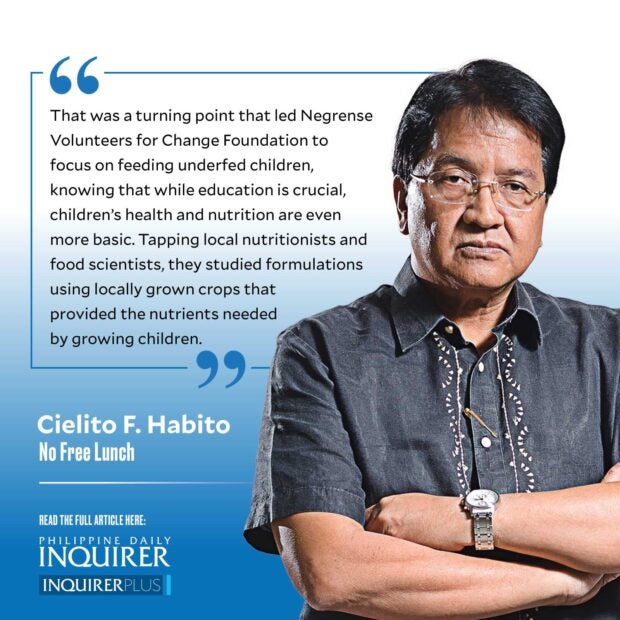Feeding hungry kids

Millie Kilayko, prime mover of the Negrense Volunteers for Change (NVC) Foundation since it started in 2010, had an epiphany of sorts upon seeing an unusually tall boy in a kindergarten class they had helped build a classroom for in 2011. NVC started out helping build classrooms for underequipped schools on Negros Island. That kindergarten boy was 9 years old, and the teacher explained that his parents were so poor that they could only send one child to school in any given year, so their several children had to take turns. This boy had waited a few years for his own turn to start schooling, and Millie was aghast at the thought that it would be years later that he could move on to first grade! “What good are nice classrooms,” she thought, “if children can’t get to use them because they’re so poor and hungry?”
That was a turning point that led NVC to focus on feeding underfed children, knowing that while education is crucial, children’s health and nutrition are even more basic. Tapping local nutritionists and food scientists, they studied formulations using locally grown crops that provided the nutrients needed by growing children. They settled on a combination of rice, mung bean (mongo) and moringa (malunggay). The Department of Science and Technology offered equipment to turn them into powder, which could then be administered as a food supplement for malnourished children. They called the blend “Mingo,” and NVC’s feeding program has since been built on “Mingo Meals,” consisting of 20-gram packets of the nutritious blend that provides enough key nutrients to help bring an underweight child to a normal weight if taken daily. To date, Mingo has found use in 60 provinces.
At one point, Millie met a local squash farmer who was about to give up on farming, and she offered to buy all his produce, assuring a ready market for his harvest. Squash is one of three flavors of Mingo Meals they now produce, the others being ube (from locally grown purple yam), and chocolate (also from locally grown cacao). From the beginning, Millie insisted that only raw materials produced by local farmers would be used, so that they also directly benefit from the program.
Since 2011, NVC administered the program by identifying underweight children aged 6 to 59 months, covering more than 54,500 children to date. Feeding is home-based, with the packs distributed monthly to households with target children, who were given a minimum of one Mingo serving daily over a period of six months. Since late last year, NVC has adopted a “Level 2” protocol, which enhanced the program by extending coverage per child to a year and adding a conditional cash reward for mothers to attend quarterly health check-ups. They also added wellness counseling covering health, nutrition, and hygiene. Barangay health workers also receive cash rewards when their assigned children meet targets in the quarterly measurements of height and weight.
How successful have they been? NVC reports a success rate—the percentage of children who achieved normal weight under the program—of 83 percent under the six-month Level 1 protocol they used over 11 years until late last year. The enhanced Level 2 protocol has raised mothers’ attendance at health checks and wellness counseling to 98 percent, from only 77 percent under Level 1. In the first quarter under Level 2, they saw an 85.7 percent increase in children who achieved normal weight, compared to the same period under the old Level 1. It’s a program that works, worthy of being replicated in and adapted to other parts of the country.
While I personally witnessed NVC’s program at work in Bacolod last week as part of a Management Association of the Philippines (MAP) study visit, we’ve since learned of many similar programs done elsewhere by other similarly dedicated groups. The MAP hopes to bring its collective management expertise to achieve better linkage and synergy across such working models and is hosting a workshop today to this end, as the nation wages an urgent war against malnutrition and child stunting.
We must let a thousand flowers bloom in this crusade. And it’s best if we all try to put some order in the garden.—————–
cielito.habito@gmail.com
Disclaimer: The comments uploaded on this site do not necessarily represent or reflect the views of management and owner of Cebudailynews. We reserve the right to exclude comments that we deem to be inconsistent with our editorial standards.
